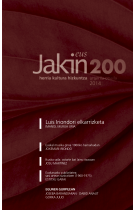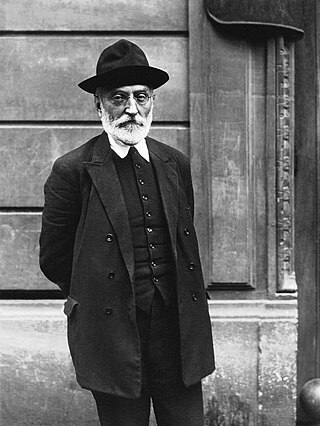
Miguel de Unamuno y Jugo was a Spanish essayist, novelist, poet, playwright, philosopher, professor of Greek and Classics, and later rector at the University of Salamanca.

Dominique Joseph Garat was a French Basque writer, lawyer, journalist, philosopher and politician.

Gipuzkoa is a province of Spain and a historical territory of the autonomous community of the Basque Country. Its capital city is Donostia-San Sebastián. Gipuzkoa shares borders with the French department of Pyrénées-Atlantiques at the northeast, with the province and autonomous community of Navarre at east, Biscay at west, Álava at southwest and the Bay of Biscay to its north. It is located at the easternmost extreme of the Cantabric Sea, in the Bay of Biscay. It has 66 kilometres of coast land.

Pío Baroja y Nessi was a Spanish writer, one of the key novelists of the Generation of '98. He was a member of an illustrious family. His brother Ricardo was a painter, writer and engraver, and his nephew Julio Caro Baroja, son of his younger sister Carmen, was a well-known anthropologist.
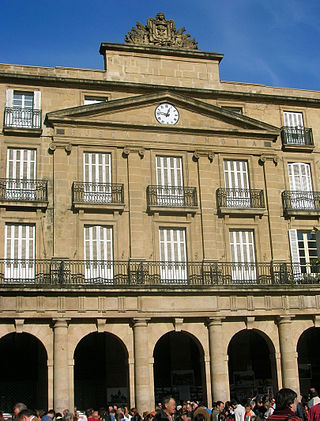
Euskaltzaindia is the official academic language regulatory institution which watches over the Basque language. It conducts research, seeks to protect the language, and establishes standards of use. It is known in Spanish as La Real Academia de la Lengua Vasca and in French as Académie de la Langue Basque.
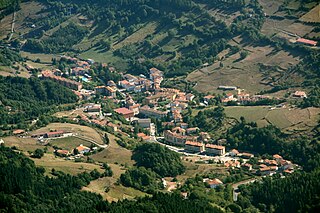
Zegama, popularly known as "The shadow of Aizkorri", is a town and municipality in the Goierri region of the province of Gipuzkoa, in the autonomous community of the Basque Country, northern Spain.

Augustin Chaho in French or Agosti Xaho in Basque was an important Romantic Basque writer. He was born in Tardets, Soule, French Basqueland on 10 October 1811 and died in Bayonne, Labourd 23 October 1858. He is considered a precursor of left-wing Basque patriotism.

Gabriel Aresti Segurola was one of the most important writers and poets in Basque language in the 20th century.
Aitor is a Basque masculine given name, created by Agosti Xaho for a Basque ancestral patriarch descending from the Biblical Tubal in his work "The Legend of Aitor" . Koldo Mitxelena believes that Xaho created it from the Souletin Basque expression aitoren semeak or aitonen semeak After Xaho, it was popularized by the Spanish-language novel Amaya o los vascos en el siglo VIII. Nowadays it is a common name among Basque males.

Koldo Mitxelena Elissalt was an eminent Spanish Basque linguist. He taught in the Department of Philology at the University of the Basque Country, and was a member of the Royal Academy of the Basque Language.

Although the first instances of coherent Basque phrases and sentences go as far back as the San Millán glosses of around 950, the large-scale damage done by periods of great instability and warfare, such as the clan wars of the Middle Ages, the Carlist Wars and the Spanish Civil War, led to the scarcity of written material predating the 16th century.

Salbatore Mitxelena was a friar and a writer in the Basque language.

José Luis Álvarez Enparantza, better known by his pseudonym Txillardegi, was a Basque linguist, politician, and writer. He was born and raised in the Basque Country, and although he did not learn the Basque language until the age of 17, he later came to be considered one of the most influential figures in Basque nationalism and culture in the second half of the 20th century. He was one of the founders of ETA, but in 1967 he left because he did not agree with its political line.

Jon Mirande was a Basque writer, poet and translator who lived in Paris. Mirande exerted a great literary influence in the 1970s and 1980s, writing in Basque literary and cultural magazines as well as Breton ones. He wrote poetry and short stories in his youth, and essays and novels in his later years. Mirande was a nationalist and believed in the value of ethnicity, especially in the Basque language, but he was also pagan and laid claim to the values of paganism and of the ancient Basques.
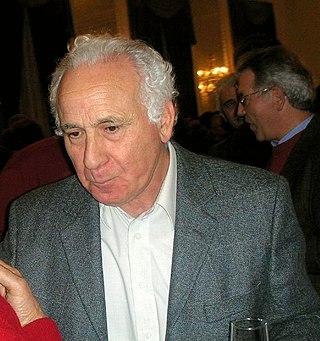
Joxe Azurmendi Otaegi is a Basque writer, philosopher, essayist and poet. He has published numerous articles and books on ethics, politics, the philosophy of language, technique, Basque literature and philosophy in general.
Azurmendi is a Basque surname. Notable people with the surname include:
Joan Mari Torrealdai Nabea was a Basque writer, journalist and sociologist. He was a member of Euskaltzaindia. He was born in Forua, Biscay, Basque Autonomous Community, Spain.
Eneko Atxa Azurmendi is a Spanish Basque cuisine chef, known for his sustainability practices.
Joxe is a Basque masculine given name and a French surname. Notable people with the name include:
